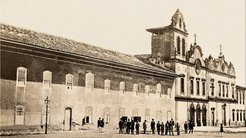Scientific legal discourse of modern Brazil. Normative knowledge production in the law schools of Recife and Sao Paulo, 1827-1917
Forschungsprojekt

On 11 August 1827, the Empire of Brazil established the first two schools of law in its history –both of which still exist today. Having just celebrated its fourth year of independence, the simultaneous founding of the two law schools shows just how important and strategic the country considered the establishment of legal science. On the one hand, Brazilian legal science endeavored to detach itself from the Portuguese and Iberian legal tradition, while at the same time drawing closer to French legal doctrine and the Historical School of Savigny.
The challenges and tasks were formidable and required the efforts of several generations of professors and legal scholars who were suddenly thrust into the roles of judges, legislators and statesmen. Bearing this in mind, I am setting out to write a history of the production of normative knowledge at the two first Brazilian law schools by linking their epistemic communities with epistemic communities from distinct parts of the world in such way that local phenomena are seen as entanglements within a global history.
By examining the legal biographies of leading professors of each generation at both schools, and by reconstituting their libraries, personal collections and pragmatic-normative works, the following features come to the fore:
- the emergence and development of law schools and legal science in Brazil;
- the circulation and translation of international normative knowledge – notably, German, Spanish, French and Portuguese – in the curricula and in the pragmatic-normative literature of Recife and Sao Paulo; and
- the structures of normative knowledge at each law school, using the production of normative knowledge by the key proponents of each generation as the guiding idea.
The aim here is to shed light on a crucial period in Brazil's legal history and its connections to the global legal discourse. By offering insights into the intricate dynamics of normative knowledge production, we contribute to a deeper understanding of how these law schools played a vital role in shaping the legal landscape of modern Brazil.
